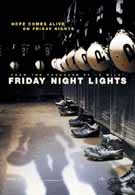I was just a child when I first saw Hoosiers, a kid who really wasn’t into sports. Still, Hoosiers hooked me in that broad way that only the best sports movies can. It didn’t matter that I didn’t understand basketball or that I’d never seen it played. The best sports movies are about more than just the sport in which they’re set; they touch on more universal themes of camaraderie and achievement against the odds. The best sports stories are those of the underdog succeeding in the face of the impossible, personal stories of individuals discovering unknown strength in themselves, often with the help of a wily old coach. Those movies transcend the sport in which they choose as a means to tell their tale. You don’t have to love or even understand hockey to leap out of your seat and cheer at the end of Miracle. It doesn’t matter if you care about football when you’re watching Rudy, because you’re not rooting for the sport, you’re rooting for the little guy.
Friday Night Lights is not one of those great sports movies because it is too caught up in the game itself to connect on any of those more important levels. That’s somewhat ironic, since after watching it I’m not completely sure whether the guys who made it actually like high school football. Much of the movie seems almost like a condemnation of the publicly funded sport, at least in the very brief moments the film spends outside the games themselves.
Based on a true story, Friday Night Lights is set in the small West Texas town of Odessa. The people of Odessa love football beyond the point of reason. They have an unhealthy obsession with their high school team, the Odessa-Permian Panthers, prioritizing the building of a new, snazzy football stadium above more lofty things like properly funding their children’s education. That might sound bizarre, but at one time it was a fact of life in Texas, and in many places I imagine it still is. My own small town Texas high school years were spent largely without books because the school board was spending their budget to build a massive stadium. It’s a common story in Texas, one of whacked out priorities and rabid parents who push their kids in a sport that for most of them is ultimately a dead end.
The movie opens at the beginning of football pre-season, with the team’s key players arriving at practice and hitting the field. Their coach Gary Gaines (Billy Bob Thornton) stalks the sidelines, shouting when necessary and staring dully at his team. It’s his second year as coach and this year, by centering his entire team around their flamboyant star player Boobie Miles (Derek Luke), Gaines is expected to win State. In fact, the citizens of Odessa will accept nothing less, and in the few flashes we’re shown off the field, the people of the town stop Gaines to offer him coaching advice, or in some cases ply him with vague threats of what will happen to him if they don’t win.
Gaines continues to plod along rather vacantly, ignoring his players’ personal problems on display in practice, right on in to their first game. Of course, since they’re relying entirely on Boobie Miles to carry the team, Boobie is injured their first game out. It’s a career ending injury for Boobie, who beyond football has nothing else. In fact, the star player can barely read, having been given automatic A’s in every class since the realization of his athletic talent. Without Boobie the team is thrown into disarray and Gaines is left to try and pull something together out of whatever he has left.
The team isn’t a bunch of underdogs exactly, without Boobie they are still one of the best teams in the state, so it’s not exactly like you’re rooting for a downtrodden loser. It’s more like rooting for the LA Lakers without Shaq. What are we hoping for here? We’re cheering for a bunch of spoiled players who are likely destined to go nowhere and be nothing once the year is over. At least the Lakers can console themselves with their Porches. In a particularly poignant moment one player’s father (who also played football at Permian) tells him not to miss a single minute of this year, because that’s all he’ll ever have. Losing might be the best thing that could possibly happen to this team, maybe it’ll jar them back into the real world where unless you’re Emmit Smith, playing football doesn’t mean jack. Why should I care if a bunch of over-privileged favorites win?
Mostly though, Friday Night Lights is about showing us football. Very little time is spent off the field, the focus being almost entirely on showcasing beautifully photographed in-game footage. I loved the way Director Peter Berg shoots his camera around the stadium, jumping around players or standing steady as they leap in from off frame to deliver an absolutely bone jarring hit. Berg makes extensive use of overexposed handheld cameras to cultivate a documentary style feel for Friday Night Lights. Games are filled with thundering sounds and blinding lights meant to underline the savagery of the event. It feels firmly authentic, like a slightly pumped up version of film stolen from ESPN.
Your Daily Blend of Entertainment News
But Friday Night Lights never connects with its characters, spreading itself thin over several players and only just touching on the turmoil faced by the team’s coach and his family. When Coach Gaines’ worries about being fired his wife suggests moving to Alaska, “I bet they don’t take their football half as seriously in Alaska,” she remarks. But any real exploration of what the town’s unceasing pressure is doing to Gaines never goes beyond that. His players are only seen outside the game in a series of quick snapshots, some of them so quick that you may not even know most of the key player’s names. Each deals with their own personal issues, but they’re only given cursory examination, the movie and the team’s coach both take little interest in them beyond that.
Friday Night Lights is a movie for hardcore high school football fans. It’s a movie for the Al Bundys out there who threw ten touchdowns in a single game and then spent the rest of their lives selling large women’s shoes. How you view the film will undoubtedly depend on how much you share the movie's unhealthy attitude towards competitive sports. This is a movie that’s about the game, to the exclusion of all else. The film’s darker moments of tragedy resulting from football obsession are sabotaged in favor of simply watching the kids play. Luckily watching Berg work his camera to bring an authentic game experience to the screen is in its own way a thrill, about on par with the same thrill any sports fan gets Sunday afternoon watching the NFL. However, what could have been a biting piece of social commentary is muddied in favor of rah rah game time footage, which without any real heart behind it is mighty hard to embrace.

